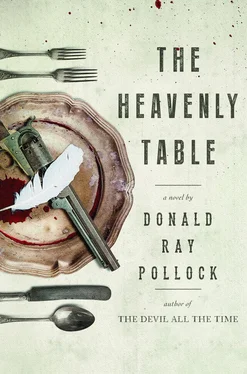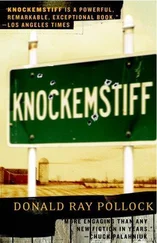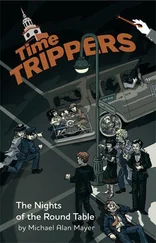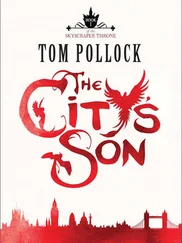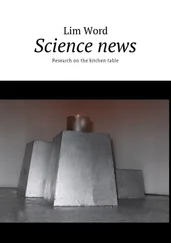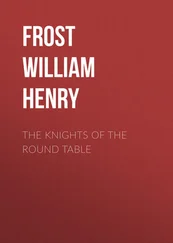“Stick with us,” Cane said, and after a moment’s hesitation, Cob agreed with a nod of his head, though it was obvious his heart wasn’t in it.
“Okay, at least we got that shit out of the way,” Chimney said, taking another hit off the bottle.
“But why Farleigh?” Cob said. “They some bad people in that town. Don’t you remember what they did the last time we went through there?”
“Sure, I do,” Cane said. “I reckon I remember everything about that goddamn place.” The year before, when they were looking for work, a man gutting a turtle under a railroad trestle had told them about a farmer named Tardweller on the other side of Farleigh who might be hiring. It was a Sunday and they were on their way to talk to him. Just a hundred yards or so before the rutted clay road turned into a smooth graveled street, they passed a corpse hanging from an elm tree, a white man with a piece of cardboard pinned to his bloody long johns that said RAPEST. Some citizens loitering around a fountain in the square, admiring someone’s new automobile, told them to keep moving when Pearl asked if they might get a sup of water. He commenced to preaching to them about charity and the life in the world to come and the heavenly table, and somebody in the crowd bounced a rock off his forehead. By the time they made it out of there, even the women gathered in front of the brick church were hurling stones at them.
“That was a sight, wasn’t it?” Chimney said. “The way they’d clipped that ol’ boy’s pecker off?”
“I ain’t a-killin’ nobody, though,” said Cob.
“You won’t have to,” Cane assured him. “If there’s any trouble, me and Chimney will take care of it. I promise ye.”
WITH STILL SEVERAL miles to go before he made it home, Ellsworth came to a pasture that brought back a distant memory. Since he felt the need to take a leak anyway, he stopped the mule and stepped off the wagon onto the dirt road. As he unbuttoned his fly, he looked down into the field, and thought back on an evening when he was a young boy. It was in the early part of the winter and he was with his father. They had spent the day cutting firewood for a widow woman over on Storm Station Road; and they were on their way home, tired and hungry. The old lady had offered them part of her dinner, some moldy bread smeared with lard, and it had bothered his father the rest of the afternoon, trying to decide if he should take a dollar from someone who was obviously even poorer than they were. In the end, he had allowed to Ellsworth that fifty cents was plenty for chopping two ricks of wood, and that’s what he had charged her.
His father was puffing on his pipe and talking about something, probably the weather or what he planned to plant in the spring, Ellsworth couldn’t recall what now. A snow was beginning to fall. In the gray twilight, he had seen a rabbit poke its head out of a burrowed place in the dead brown leaves along the edge of a ditch that ran down the middle of the field. Though nearly forty years had passed since that day, the culvert was still there, still overgrown. Thinking now of that rabbit, all alone on that cold winter night with the snow starting to cover the ground, a sweet and sorrowful feeling overcame him. Of course, he knew that that creature had died long ago, just as his father did a few winters later. But with a swelling in his throat, he wondered, almost desperately it felt like, if he might find some sign of that rabbit were he to go down there and search among the weeds and brambles. His eyes began to water. So many had passed on in his lifetime, and so much had happened or not happened that had taken him further and further away from the boy he was back then. No, he thought, as he wiped his sleeve across his face, he wouldn’t find anything, not a sliver of bone or a shred of fur, not if he hunted for a week. The rabbit was gone forever, and that saddened him in much the same way the stars sometimes did at night, the way they kept shifting in the same abiding patterns, as regular as clockwork, year after year, century after century, regardless of what went on down here on this godforsaken ball of rock and clay, be it young men getting butchered in another war, or some crazy blind man living with a dead bird, or an innocent babe drowning in a rat-infested outhouse, or even some poor shivering rabbit sticking his head out of the weeds to watch a farm boy making his way home with his father.
A couple of hours later, he unhitched Buck from the wagon and led him into the barn. After making sure he had water and feed, Ellsworth climbed into the hayloft and took a couple of pulls from one of the jugs he had hidden there. Then he headed for the house, still half lost in the bittersweet nostalgia brought on by the pasture.
Eula was sitting barefoot on the front steps in the dusk, sucking on a piece of bacon rind and trying not to think about Pickles. In her hand was an orange bloom she’d pulled off the trumpet vine that filled a trellis at the end of the porch. The last day and a half had been the longest time she’d ever spent entirely alone since her marriage, and she had missed having the cat around more than ever. There had been a moment this morning when her grief nearly overwhelmed her, and she had hurt so much she would have almost traded her husband and son both for the chance to spend even just one more hour with Pickles. “So you didn’t find him?” she asked.
Ellsworth stopped and looked up, a little startled by her voice. For a brief moment, he believed she was talking about the rabbit in the ditch, but then he remembered Eddie and the purpose of his trip. “Well, I did and I didn’t,” he said. He wished now he’d gone ahead and bought a broom at the Woolworth’s. Now that he thought about it, Parker would probably charge him twice as much for one.
“Did ye see him?”
“No, they wouldn’t allow it.”
“Who?” she asked. “Who wouldn’t?”
“The army. He’d already signed the papers by the time I got there.”
“So you was right after all.”
“At least we know where he is now,” Ellsworth said. He turned and watched some purple martins darting and pirouetting in the darkening air across the road. “Who knows? Maybe this will be good for him.”
Biting the bacon rind in two, Eula tossed the flower into the yard and started to stand. “Well, go ahead and get washed up while I put out your supper. Then you can tell me all about it.”
IT WAS AFTER midnight when they left the shack and started through the piney woods toward Tardweller’s manse. They had decided to leave most of their belongings behind, and so, besides the two books and their blankets, they carried only Pearl’s old shotgun and his straight razor and the two machetes. A sickly yellow half-moon lit their way. When they arrived at the edge of the yard, they stood in a copse of evergreens and watched for signs of life inside the dark two-story house. Except for the chirping of the crickets and the gurgling of their guts, everything was quiet.
“I ain’t never stole nothing in my life,” Cob said miserably. He wished more than anything that his brothers would change their minds, and just head back to the shack. If they got some sleep, maybe tomorrow they wouldn’t be so gung-ho about turning outlaw. And wait a minute, what about the chicken bonus? Why, he bet they hadn’t even thought of that.
He was just getting ready to mention it when Cane said suddenly, “Come on, let’s go,” and they were hurrying across the open ground to the barn, stooped over like apes. Chimney unlatched the door quietly and pulled it open just enough for them to slip inside. They stood there for a minute while their eyes adjusted to the darkness, and then Cane handed Cob the shotgun. “Keep an eye on the house,” he whispered.
Читать дальше
